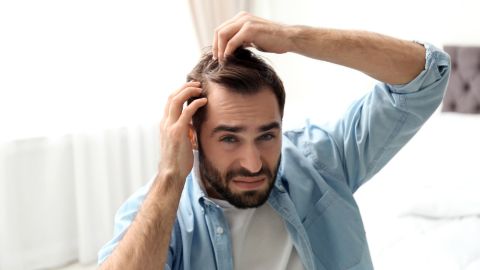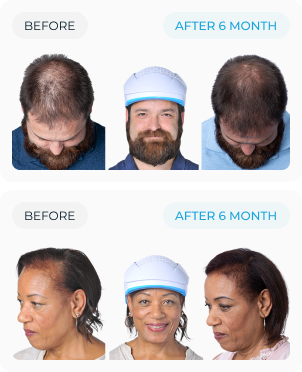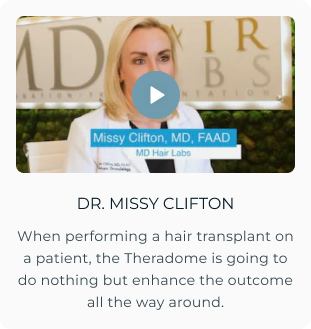Are you struggling with hair loss? Would your thyroid be to blame? You're not alone. Many people ask, "Can thyroid issues cause hair loss?" Understanding the connection between thyroid problems and hair loss is crucial for finding solutions.
Hair loss is a common concern for many people, and it's natural to look for possible explanations. One possible cause of hair loss is thyroid problems. The thyroid is a small gland located in the front of your neck, and it plays a crucial role in regulating your body's metabolism. When the thyroid isn't functioning correctly, it can disrupt the normal hair growth cycle, leading to hair loss.
Are you having difficulty concentrating, or are you gaining weight? Are you becoming prone to constipation and muscle aches? Is your skin becoming dry and brittle? Perhaps most crucially, are you suffering from thyroid-related hair loss?
These are all signs you might have an undiagnosed thyroid disorder! Thyroid problems can cause hair loss.
There are, as you probably know, a thousand and one reasons behind excessive hair loss: stress, environmental factors, genetics, underlying medical conditions, medications, hormonal changes…the list goes on. Hormonal changes, in particular, are extremely common and quite complex to diagnose and treat.
While their mechanism is still obscure, their effects can still very much be observed. So if you’ve noticed that your hair is thinning out, and you don’t know why. This happens especially if your hair loss is accompanied with the plethora of other lovely problems highlighted above - ruling out a thyroid imbalance is definitely on your TO-DO list.
So, let's look at what thyroid hair loss looks like and how to treat it! First, let's understand the link between thyroid issues and hair loss.
Understanding Relationship Between Thyroid Problems and Hair Loss
A thyroid is a small, butterfly-shaped gland located in your neck. The thyroid gland produces two key hormones: triiodothyronine (T3) and thyroxine (T4). These hormones regulate all of your metabolic functions, including hair growth!
If you’re healthy, most of your hair follicles at any given time are in their growing phase (anagen), while a minority are in the resting phase– telogen. However, the slightest variation in your thyroid hormone levels will throw off your normal hair cycle. And not in a good way! Your hair follicles won’t remain in anagen, will transition to the telogen phase, and will fall out far too quickly.
According to the Journal Of Sex on Thyroid Diseases and Gender, women have a significantly greater chance of suffering from thyroid disorders compared to men. Research reveals that women are five to eight times more likely to develop thyroid diseases. Women experience more hormonal changes throughout their lives, including during puberty, menstrual cycles, pregnancy, postpartum, and menopause. These fluctuations can impact thyroid function and hence, thyroid disorder and hair loss are quite common among women.
Can Hypothyroidism Cause Hair Loss?
There are two main types of thyroid disorders, both of which can lead to hair loss. Your thyroid will either secrete too many hormones (a condition called hyperthyroidism) or not enough (known as hypothyroidism). Hair loss and thinning most commonly occurs with hypothyroidism, although it can occur with either.
Why? Hypo, not to be confused with hippo, comes from the Greek preposition hypo– meaning “under” or “below”. Hypothyroidism can cause hair loss and hair thinning because the condition leads to a decrease in thyroid hormone production, resulting in a slower metabolic rate. As a result, the hair follicles receive insufficient energy to function optimally, leading to hair loss.
In many cases, an autoimmune condition called Hashimoto's is the cause of hypothyroidism. This means your immune system is attacking your thyroid tissue, leading to symptoms such as hair thinning and hair loss.
Unfortunately, some physicians don’t opt for testing antibodies that determine if the thyroid condition is autoimmune. This is why it’s always important to do thorough research before consulting physicians and choosing to take a course of action. The last thing you want to do is suppress a condition rather than treat the root of its cause.
However, you may want to protect your hair to restore the hair you lost and prevent further damage if you are working to treat the root cause of hypothyroidism hair loss.
Can Hyperthyroidism Cause Hair Loss?
Hyperthyroidism, or overactive thyroid is a health condition where the thyroid gland produces an excess amount of thyroid hormones that the body needs. When the level of thyroid hormone is higher, the body's metabolism is accelerated, including the processes within hair follicles. A significant number of hair follicles prematurely enter the resting phase. In many cases, an autoimmune condition called Graves' Disease is the cause of hyperthyroidism. In Graves' Disease, the immune system mistakenly attacks the thyroid gland causing more production of thyroid stimulating hormone. Thus, symptoms like increased shedding and diffuse hair loss across the scalp can be experienced.
What Does Thyroid Hair Loss Look Like

Hair loss caused by thyroid is also known as thyroid alopecia. Imbalances in thyroid hormones cause it. Thyroid hair loss can look in various ways, and understanding the characteristics can help identify and address the underlying issue. Two main types of thyroid conditions can lead to hair loss: Hypothyroidism (underactive thyroid) and hyperthyroidism (overactive thyroid). Here's what thyroid hair loss looks like:
1. Increased Hair Shedding
Both hyperthyroidism and hypothyroidism can cause excessive hair shedding, which you’ll notice when combing, brushing, or washing your hair. When you have a thyroid disorder, your hair follicles can enter the resting phase prematurely, leading to more hair falling out. The excess shedding can give the appearance of thinning hair or a noticeable increase in hair loss.
2. Thinning Hair
Thyroid-related hair loss often leads to hair thinning, especially on the scalp. You may notice your hair is less dense and lacks its usual volume. The reason is the hair follicles are not able to produce and maintain hair growth effectively due to the thyroid imbalance.
3. Changes in Hair Texture
In addition to increased shedding and thinning hair, changes in hair texture can also be a sign of thyroid hair loss. Both hyperthyroidism and hypothyroidism can cause excessive hair shedding, which you’ll notice when combing, brushing, or washing your hair. People with an underactive thyroid may experience hair that becomes dry, brittle, and more prone to breakage. It can lose its natural shine and appear dull. On the other hand, those with an overactive thyroid may notice that their hair becomes softer, finer, or more delicate than usual.
4. Hair Breakage
Thyroid dysfunction may cause a weakened state of the hair, and you might experience increased hair breakage. This can make your hair appear frizzy and difficult to manage.
Also see the signs of unhealthy hair that can cause hair breakage.
5. Receding Hairline
In some cases, thyroid-related hair loss can cause a receding hairline, especially around the temples. Individuals with thyroid disorders may notice the hairline gradually moving backward, creating a more prominent forehead or a thinning hairline. The reason for this is the disruption in hair follicle function caused by the thyroid imbalance.It's important to note that not everyone with thyroid-related hair loss will experience a receding hairline, as the pattern can vary among individuals.
Also Read: Mature or Receding Hairline: How to Identify
6. Eyebrow and Body Hair Changes
Thyroid issues can also affect the hair on the eyebrows and the body. You may notice thinning or loss of eyebrow hair, as well as changes in body hair growth.
7. Delayed Hair Growth
If you have experienced hair loss due to thyroid problems, the new hair growth might be slower than usual, contributing to the overall thinning appearance of your hair.
How to Treat Thyroid Related Hair Loss
To treat thyroid hair loss effectively, it is essential to deal with the underlying thyroid condition, whether it is hypothyroidism (underactive thyroid) or hyperthyroidism (overactive thyroid). Here are some approaches commonly used in the treatment of thyroid-related hair loss:
Hypothyroidism (Underactive Thyroid)
It is often treated with synthetic thyroid hormone replacement therapy. It is typically in the form of levothyroxine. The therapy's purpose is to bring the thyroid stimulating hormone levels back to normal. As the hormone levels stabilize, hair loss related to underactive thyroid can gradually improve over time. However, you need to remain patient since it may take several months to notice improvements. If you don't respond well to levothyroxine alone, then the doctor may prescribe you liothyronine. Liothyronine is a synthetic form of the T3 hormone that can help achieve the desired thyroid hormone levels and improve symptoms such as underactive thyroid-related hair loss.
Hyperthyroidism (Overactive Thyroid)
It is often treated by addressing the underlying cause. The treatments for hyperthyroidism include the use of antithyroid medications (like methimazole or propylthiouracil) to reduce thyroid hormone production, radioactive iodine therapy to shrink the thyroid gland, or surgery to remove part or all of the thyroid gland (thyroidectomy). Once the condition is brought under control, issues such as overactive thyroid-related hair loss can improve, but it might take some time to notice the changes.
Treating the thyroid is a way to promote hair growth, but there are some additional considerations:
Nutrition: A diet that includes all the essential nutrients, including iron, zinc, minerals, vitamins, and biotin, can support healthy hair growth.
Stress Management: Stress can exacerbate hair loss. That's why managing stress through relaxation techniques, exercise, and mindfulness can be beneficial.
Topical Treatments: Some individuals might also opt for topical treatments like minoxidil (Rogaine) to help stimulate hair growth.
Hair Care Practices: Be gentle with your hair to minimize breakage. Avoid heavy styling, tight hairstyles, and harsh hair products.
Does Thyroid Medication Cause Hair Loss?
When starting levothyroxine drug for hypothyroidism, some people experience increased hair shedding initially. This is because the medicine takes some time to stabilize the thyroid hormone and hair growth cycle to adjust. The hair loss is usually of short period, which resolves on its own after 1-2 months as the body adapts to the medication. Similarly, drugs like carbimazole and propylthiouracil which are used to treat hyperthyroidism can lead to hair loss in some cases. However, it's important to note that hair loss is a common symptom of hypothyroidism and hyperthyroidism itself, regardless of the medication used to treat it.
Treating Naturally
Thyroid disorders can indeed cause hair loss. And how thyroid hair loss looks can vary from diffuse thinning to excessive shedding and changes in hair texture. However, you can naturally treat your hair loss without suffering from ill side effects. You just need to pick the right solution.
Many patients who are diagnosed with thyroid disorders and hair loss end up following a regimen of laser hair therapy. Do you know that laser hair therapy has no side effects and is clinically proven to be effective? A technologically advanced laser hair therapy device, such as the Theradome LH80 PRO and EVO, ensures that the mitochondria of hair cells get treated with the perfect dosage of energy to reverse hair loss at a cellular level. And there is no need to tighten your belt and schedule expensive and inconvenient visits to laser hair therapy clinics. The FDA-cleared Theradome is affordable, convenient, and delivers clinical strength results for thyroid hair loss from the comfort of your own home.
Ready to unveil your potential for hair regrowth? Theradome's laser helmet is your answer. Embrace a future with healthier, thicker hair by acting now. Take the first step towards transformation!

























